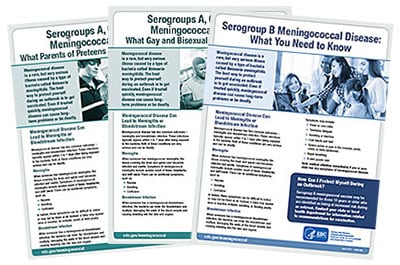CDC issued a Health Alert Network (HAN) Health Advisory on March 28, 2024, about the increase in invasive serogroup Y meningococcal disease in the United States.
Outbreaks and Public Health Response
Outbreaks of meningococcal disease are rare in the United States. In fact, only about 1 in 20 cases is related to outbreaks. However, outbreaks are unpredictable, and the outcomes can be devastating to affected communities and organizations. In certain outbreaks, CDC recommends vaccination against meningococcal disease to help stop the disease from spreading.
Outbreaks listed here go to content currently published on the CDC website, if available, or the appropriate health department’s website.
Colorado health officials are responding to cases of meningococcal disease among people experiencing homelessness.
Virginia health officials are responding to a statewide meningococcal disease outbreak.
U.S. cases of meningococcal disease have increased sharply since 2021 and now exceed pre-pandemic levels.
Outbreak definition
A meningococcal disease outbreak occurs when multiple cases of the same serogroup (type) happen in a population over a short time period. Outbreaks can occur in communities, schools, colleges, prisons, and other populations. Depending on the population size and specific circumstances, health officials may declare an outbreak after just two cases.
Outbreak control measures
State and local health departments lead outbreak investigations and implement control measures to reduce spread of the disease. They often work closely with CDC, which has guidance [4 MB, 16 pages] to assist with this. In the setting of an outbreak, recommendations often include:
- Vaccinating people identified as being at increased risk
- Making sure all close contacts of a patient receive antibiotics to prevent them from getting the disease (prophylaxis)
CDC supports state and local health departments in identifying a response that best protects their residents’ health. Contact the state or local health department, or affected institution, for information about a specific outbreak and their specific recommendations.
View CDC guidance for the evaluation and public health management of suspected outbreaks of meningococcal disease in the United States.
Vaccination
CDC recommends vaccinating people identified as being at increased risk during a meningococcal disease outbreak. Which vaccine they should receive depends on the serogroup causing the outbreak.
Outbreaks caused by serogroup A, C, W, or Y
CDC recommends vaccination with a meningococcal conjugate (MenACWY) vaccine for anyone 2 months or older identified as being at increased risk. CDC recommends a booster shot for those at increased risk due to an outbreak who received the vaccine more than 5 years prior.
Outbreaks caused by serogroup B
CDC recommends vaccination with a serogroup B meningococcal (MenB) vaccine for anyone 10 years or older identified as being at increased risk. CDC recommends a booster shot for those at increased risk due to an outbreak who previously received the vaccine series.

Meningococcal disease fact sheets
CDC offers fact sheets about meningococcal disease, a rare but very serious illness. There is a general fact sheet and versions tailored for groups more likely to be affected by meningococcal disease outbreaks.
Prophylaxis
Public health experts recommend that all close contacts of a patient receive antibiotics to prevent them from getting the disease. Close contacts include:
- People in the same household
- Roommates
- Anyone with direct contact with the patient’s saliva (such as a kissing partner)
CDC supports state and local health departments in identifying a response that best protects their residents’ health.
View CDC guidance on discontinuing use of ciprofloxacin for prophylaxis of close contacts in areas with ciprofloxacin resistance.